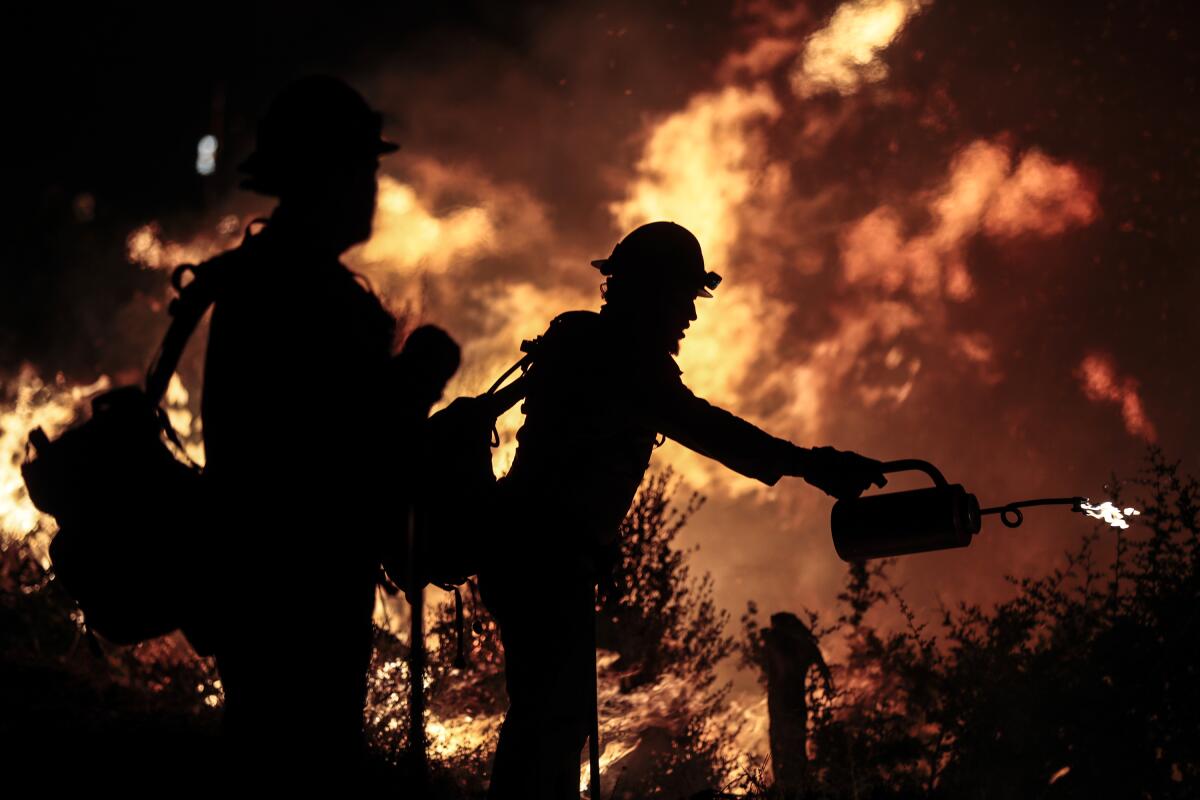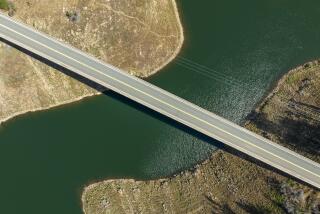In reversal, Trump administration approves California wildfire relief funding

A rejection from the Federal Emergency Management Agency to provide aid to California for numerous recent wildfires was reversed Friday following appeals from the governor and Republican lawmakers.
âJust got off the phone with President Trump who has approved our Major Disaster Declaration request. Grateful for his quick response,â Gov. Gavin Newsom said in an afternoon statement.
The prior evening, FEMA rejected the stateâs request for disaster relief funds for six recent California wildfires, including Los Angeles Countyâs Bobcat fire, San Bernardino Countyâs El Dorado fire, and the Creek fire, one of the largest that continues to burn in Fresno and Madera counties.
The decision was met with outcry from officials in California, which has experienced its worst fire season on record in 2020.
âI have personally toured the damaged areas and listened to heartbreaking stories from people who lost their homes and businesses to the Creek fire,â state Sen. Andreas Borgeas (R-Modesto) wrote in a letter to the White House on Friday, asking it to reconsider FEMAâs decision. âMany of the structures destroyed were located on federal lands and the surrounding communities supported tourists who come to enjoy the National Parks.â
Borgeasâ district includes the Sierra National Forest, where the Creek fire has burned some 340,000 acres and where National Guard troops recently helped airlift hundreds of people cut off due to the flames. Trump recognized those troop members in a recent ceremony in Sacramento.
When word of FEMAâs initial rejection first reached California, emergency officials scrambled to find money in a budget already devastated by the coronavirus. Within hours however, Rep. Tom McClintock (R-Elk Grove) tweeted that House Minority Leader Kevin McCarthy (R-Bakersfield) had spoken with Trump and that a âPresidential Disaster Declaration is imminent and help is on the way.â
The governorâs office soon confirmed that assertion.
Newsom on Friday said he spoke with Trump about reconsidering the stateâs rejected application for federal wildfire assistance and the president, who was aboard Air Force One, almost immediately said he would approve it. âI couldnât even finish the ask,â Newsom said during a remote appearance at the Milken Instituteâs Global Conference. âHe said, âYou got it. Iâm signing off on that major disaster declaration in California.â â
Despite the contentious relationship between California and the president, Newsom has consistently said thatâs heâs had a good working relationship with the administration when dealing with the COVID-19 pandemic and response to the stateâs wildfires.
The stateâs fires have been fueled by several factors, including climate change. Trump has repeatedly criticized California for its handling of fire policy, sometimes with misleading claims, and had rejected the role of rising temperatures as a factor.
More than 4 million acres have burned this year, more than double the stateâs previous record. The fires have scorched an area larger than the state of Connecticut and have killed 31 people.
A major disaster declaration allows for cost-sharing for staffing, damage, cleanup and rebuilding between the state and federal government. It also activates federal programs led by FEMA.
In its initial rejection, FEMA said the fires âwere not of such severity and magnitude to exceed the combined capabilities of the state, affected local governments, voluntary agencies and other responding federal agencies.â
The agency said it was already assisting the state in combating wildfires. âFEMA approved four Fire Management Assistance Grants in five counties for wildfires included in the stateâs disaster request, allowing reimbursement to state, local governments and other eligible agencies for 75% of firefighting, evacuation and sheltering costs. These grants will deliver millions of dollars of assistance for emergency expenses and funds to help reduce the risks of future disasters. If the state identifies additional information to support the request, it may appeal the decision within 30 days.â
The state and local governments rely on FEMA every year to help recover up to 75% of their staffing costs for sending firefighters into other jurisdictions â including onto federal land â to help fight wildfires for weeks at a time.
Federal documents filed with the National Interagency Fire Center show costs to date to fight the Bobcat fire in Los Angeles County, the El Dorado fire in San Bernardino County and the Slater fire in Siskiyou County were $67.8 million, $38.4 million and $44.8 million, respectively. The agencies that sent firefighters to these incidents generally expect to be paid back a portion of the costs for sending their crews.
California did not ask for a specific dollar amount because damage estimates are not complete, said Brian Ferguson, deputy director of crisis communication and media relations for the governorâs Office of Emergency Services.
âThe true cost wonât be known for months or years afterward,â he said.
He added: âWhat the state is looking for is the highest level of federal support, which requires the highest bars be cleared. But we feel our case for those requirements has been met.â
According to Ferguson, such aid could easily reach into the hundreds of millions of dollars.
The state is also asking for aid for San Diego Countyâs Valley fire and Mendocino Countyâs Oak fire.
Newsom formally submitted a letter to the White House and FEMA on Sept. 28 asking for such a declaration and citing the fact that five of the six largest fires in Californiaâs recorded history have taken place this year.
The biggest is the August Complex fire, which began Aug. 16 and as of Oct. 15 had burned just over 1 million acres through seven Northern California counties and was 77% contained.
Newsom also said funds would go toward helping rebuild public infrastructure, miles of roads, parks, signs and fire shelters.
âMany of the counties impacted by these wildfires are still recovering from previous devastating wildfires, storms and the effects of the COVID-19 pandemic,â Newsom wrote.
He added, âCalifornians are exhausted.â
Many residents lost homes and property that was uninsured. According to Newsom, as of Sept. 28, 959 residences were destroyed by fires and 90 more were damaged, totaling an estimated $264,289,200.
The governor also noted the cash-strapped nature of the state, which is projecting a pandemic-induced $54.3-billion deficit this fiscal year.
In February, the federal government agreed to pay back California more than $170 million for repair to the Oroville Dam spillway. Overall, the government kicked in $562.5 million for the project.
California previously successfully applied for a declaration from the federal government for two fires caused by lightning, including the Complex fire, in August.
Newsom will also probably ask for another disaster declaration, Ferguson said, for the Glass fire in Sonoma County and the Zogg fire in Shasta County. The Zogg fire was extinguished on Tuesday, while the Glass fire is 97% contained.
For many in state government, FEMAâs initial decision to reject the funding request was reminiscent a Trump tweet last year in which the president said FEMA should withhold aid to California unless state officials âget their act together, which is unlikely.â
The administration ultimately backed off on that threat.
More to Read
Sign up for Essential California
The most important California stories and recommendations in your inbox every morning.
You may occasionally receive promotional content from the Los Angeles Times.













